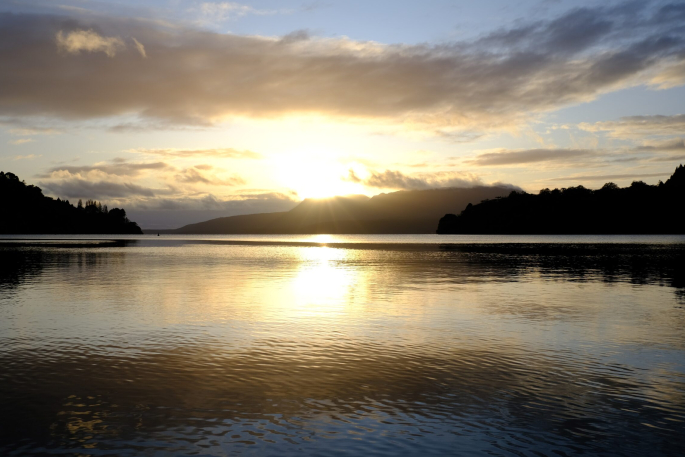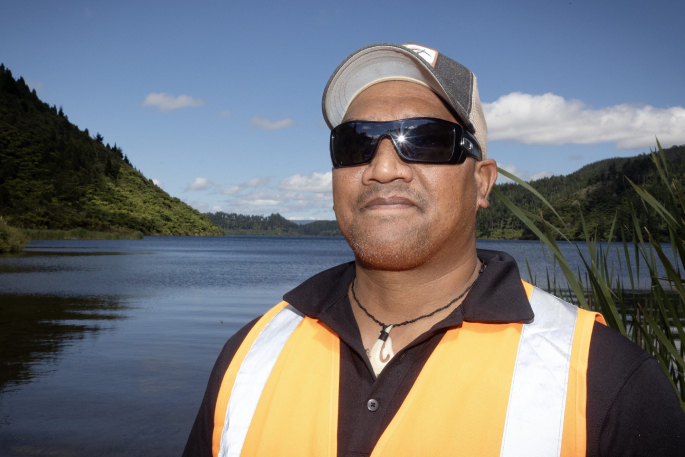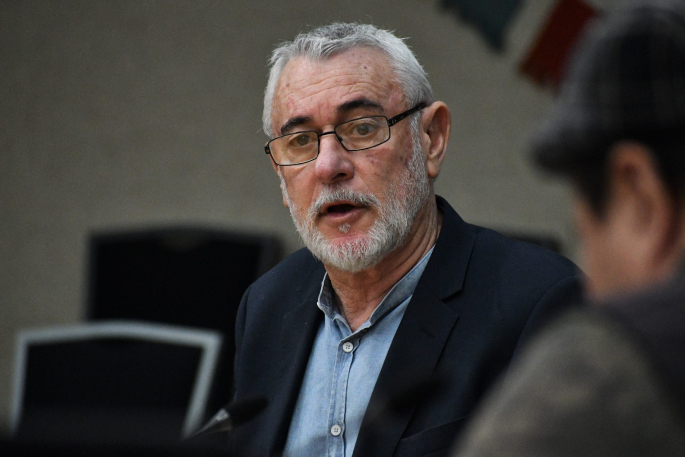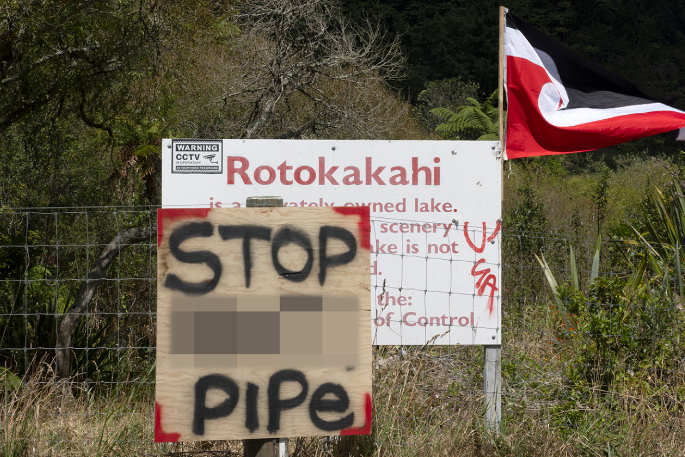A Rotorua iwi group fears council legal action will limit its ability to peacefully protest a sewerage project it believes poses pollution risks to a sacred lake.
Rotorua Lakes Council has applied to the Rotorua District Court for an injunction to stop “interference” with construction of the $29 million Tarawera Wastewater Reticulation Scheme.
The council says work was paused in January after “protest obstruction, interference with the work site and safety concerns raised by the contractor”.
The Lake Rotokākahi Board of Control manages the iwi-owned lake, also known as Green Lake. It held a protest against the scheme in January but a leader says this was peaceful and no one in its group was responsible for the incident that stopped the works.
The scheme would connect 446 Tarawera properties to the sewerage system at a controversial cost of about $50,000 each, or more if paid over time.
The first stage of the scheme began in April last year and included laying pipes along Tarawera Rd.
As grounds for its injunction application, the council claimed that between January 29 and February 1 “unknown respondents negligently, wilfully or maliciously stopped, obstructed or interfered with the works …”, and it expects this could continue when works resume.
 Lake Tarawera's community will be connected to a reticulation scheme. Photo / Supplied.
Lake Tarawera's community will be connected to a reticulation scheme. Photo / Supplied.
Its May 16 application sought orders under the Local Government Act to restrain respondents, described as “persons unknown”, from: stopping, obstructing, or interfering with the works; entering the work zone without authorisation; and stopping or obstructing authorised vehicles from accessing the work zone.
The work zone is defined as the Tarawera Rd worksite area used by council contractors and subcontractors and “identified by temporary traffic management delineators plus a 1m buffer zone around the perimeter of the worksite”.
The orders will be served by various public postings and by “emailing a copy to the subcommittee of the Lake Rotokākahi Board of Control”.
In a statement, council infrastructure and environment general manager Stavros Michael says the council understands some people don't support the pipeline and recognises people’s right to peaceful protest.
“However, [the] council is bound by legal commitments and we cannot now re-design or re-route the project, changing decisions made some four years ago which would come at a significant cost to the Tarawera community.”
The “well under way” project would protect people and the lake by stopping human waste from leaching into Lake Tarawera and was decided after “extensive community consideration” including input from iwi and hapū.
The injunction is expected to add $100,000 in legal costs.
The protest
Lake Rotokākahi is in the Tūhourangi rohe and sits near the roading corridor the pipeline follows.
The tapu (sacred) lake is privately owned by iwi and no swimming or boating is permitted. It is overseen by the Lake Rotokākahi Board of Control.
Board co-chairman Peter Moke organised the January protest at the lake’s edge and says he believes no one in the group is to blame for the incident that prompted the council’s application.
“We don’t know who the hell it was … some little dumb s**t did something.”
 Lake Rotokākahi Board of Control co-chairman Peter Moke at the lake's edge. Photo / Andrew Warner.
Lake Rotokākahi Board of Control co-chairman Peter Moke at the lake's edge. Photo / Andrew Warner.
The board has asked the council for evidence and he claims it didn't have any.
“They couldn’t even give us a photo.”
He says the protest was peaceful and prompted no complaints or arrests.
When Local Democracy Reporting visited the protest on its first day, protesters stood by the lake waving flags and signs. Moke said about 50 people attended that day.
Moke says if the injunction is granted, he believes the group will not be able to protest without repercussions.
He says the board is still concerned about the impact any potential break in the new pipeline will have on the tapu lake, and how any pollution will be cleared.
It plans a hui to discuss its response to the application, he says.
In response, Michael says the council doesn't wish to apportion responsibility for the interference incident but has provided the court with video and photos.
“The application does not name anyone or any group.”
The application didn't seek to stop people from expressing their views as long as this did not impact the council’s ability to undertake its legitimate works safely.
”The scheme network, once operational will be guided by appropriate maintenance and response procedures as required for all such networks.”
Michael calls the injunction a pre-emptive step to prevent a safety risk or damage to public assets.
 Rotorua Lakes Council infrastructure and environment general manager Stavros Michael. Photo / Laura Smith.
Rotorua Lakes Council infrastructure and environment general manager Stavros Michael. Photo / Laura Smith.
It will also make protesters and contractors aware of the boundaries, he says, and aims to avoid delays and minimise extra costs.
“The issue is not protesting, but rather physical interference and actions that put workers and public assets at risk. The injunction application aims to eliminate these behaviours.”
The district court will consider the council’s application and any opposition before making a decision.
Any order will be enforced by police or the courts.
LDR is local body journalism co-funded by RNZ and NZ On Air.




1 comment
Hmmm
Posted on 03-06-2024 14:03 | By Let's get real
Why doesn't the protest group offer an alternative and fund the difference..?
As far as I'm aware, the burial site is on the Island in the Lake, far away from the proposed pipeline and to be perfectly honest, there is likely to be far greater pollution into the lake from surrounding activities and the road.
Leave a Comment
You must be logged in to make a comment.